When it comes to nutrition and overall health benefits, fruits have the edge over vegetables. As a self-proclaimed fruit enthusiast, I have always been fascinated by the unique properties and advantages that fruits provide. Not only are they bursting with flavors and vibrant colors, but they also offer a wide range of vital nutrients that contribute to a well-balanced diet.
So, what sets fruits apart from vegetables? Let me take you on a journey through the world of fruits and unveil the reasons why they triumph over their vegetable counterparts. From their distinct definitions to their impact on our overall well-being, I’ll delve into the nutritional advantages of fruits and inspire you to choose them over vegetables.
Key Takeaways:
- Fruits offer a variety of health benefits and are superior to vegetables in terms of nutritional advantages.
- Choosing fruits over vegetables provides an array of flavors, vibrant colors, and essential nutrients.
- Fruits can be incorporated into various dishes, juices, and smoothies, enhancing both taste and nutrition.
- Consuming fruits regularly promotes overall well-being and supports a balanced diet.
- Exploring different types of fruits allows for a diverse and delicious eating experience while reaping numerous health benefits.
The Definition of Fruits and Vegetables
When it comes to discussing the differences between fruits and vegetables, it’s important to understand their definitions based on plant anatomy. While both fruits and vegetables are essential components of a healthy diet, they have distinct characteristics that set them apart.
The Distinction between Fruits and Vegetables
Fruits are the mature ovaries of flowering plants that contain seeds. They typically develop from the fertilized flower and can be consumed as fresh produce. Examples of fruits include apples, oranges, berries, and tomatoes. Yes, tomatoes are technically classified as fruits!
In contrast, vegetables encompass a broader category that consists of edible plant parts such as leaves (lettuce, spinach), stems (celery, asparagus), roots (carrots, radishes), and tubers (potatoes, sweet potatoes). These plant parts are generally consumed directly or after cooking.
Why Fruits Are Important in a Healthy Diet
Fruits have long been recognized for their nutritional benefits and are an essential part of a balanced diet. They are packed with essential vitamins, minerals, antioxidants, and dietary fiber that contribute to overall health and well-being.
Consuming a variety of fruits provides a wide range of nutrients that support various bodily functions, including immune function, digestion, and heart health. Their natural sweetness makes them a delicious and satisfying choice for those looking to satisfy their sweet tooth while maintaining a healthy lifestyle.
In addition, fruits are known for their hydrating properties as they contain high water content. This can help promote optimal hydration and contribute to healthy skin, hair, and overall hydration levels.
| Fruits | Nutritional Benefits |
|---|---|
| Apples | Rich in dietary fiber and vitamin C |
| Oranges | High in vitamin C and antioxidants |
| Berries | Packed with antioxidants and fiber |
| Tomatoes | Good source of vitamin C and lycopene |
Incorporating a variety of fruits into your daily diet helps ensure that you receive a range of essential nutrients that are vital for maintaining optimal health.
“Let food be thy medicine, and medicine be thy food.” – Hippocrates
Increasing Fruit and Vegetable Consumption
As the awareness of healthy eating continues to grow, more and more people are recognizing the health benefits of fruits and vegetables. Fruits, in particular, offer numerous advantages over vegetables, making them an essential part of a balanced diet.
One of the key benefits of eating fruits is their high nutritional value. Fruits are packed with essential vitamins, minerals, and antioxidants that support overall health and well-being. From vitamin C in citrus fruits to potassium in bananas, each fruit brings its own unique set of nutrients to the table. Regular consumption of fruits can help boost the immune system, improve digestion, and promote healthy skin.
Compared to vegetables, fruits also tend to be more appealing in taste and texture, making them a popular choice among individuals of all ages. The natural sweetness of fruits, combined with their vibrant colors and refreshing flavors, makes them a delightful addition to any meal or snack.
Furthermore, the convenience and versatility of fruits make them an excellent option for busy individuals. Most fruits can be enjoyed fresh, on their own, or easily incorporated into a variety of dishes, such as salads, smoothies, and desserts. They provide a quick and easy way to meet daily nutritional requirements and satisfy cravings for something sweet.
In recent years, increased emphasis on health and wellness has led to a rise in the consumption of fruits as part of a well-rounded diet. People are now more aware of the numerous health benefits that fruits offer and are actively seeking ways to incorporate them into their daily routines. Whether it’s through snacking on fruit during the day, adding them to meals, or opting for fruit-based desserts, the demand for fruits continues to grow.
Strategies for Incorporating More Fruits and Vegetables
As a chef or cook, finding creative ways to incorporate more fruits and vegetables into your menus can offer numerous advantages. Not only do fruits and vegetables provide essential nutrients, but they also add vibrant colors, flavors, and textures to dishes. Here are some practical strategies to help you make the most of fruits and vegetables in your culinary creations:
1. Substitute Vegetables for Meats
One effective way to increase fruit and vegetable consumption is by substituting them for meats in certain dishes. For instance, you can replace traditional meat fillings with a medley of sautéed mushrooms, bell peppers, and onions in tacos or burritos. This not only adds a delicious umami flavor but also enhances the dish’s nutritional profile.
2. Explore Plant-Based Proteins
Plant-based proteins, such as legumes, tofu, and tempeh, offer a wide range of flavors and textures that can be used to create hearty dishes. Experiment with dishes like lentil burgers, chickpea salads, or stir-fried tofu with mixed vegetables to introduce more fruits and vegetables into your menu while providing vegan and vegetarian options for your customers.
3. Incorporate Fruits into Savory Dishes
While fruits are often associated with desserts and sweet dishes, they can also bring unique flavors to savory preparations. Adding fruits like apples, berries, or citrus to salads, stir-fries, or roasted vegetable medleys can create a delightful balance of sweet and savory flavors, elevating the overall dining experience.
4. Highlight Seasonal Fruits and Vegetables
Take advantage of the variety and freshness of seasonal produce by featuring them prominently in your menu. Not only does this support local farmers, but it also ensures that you are serving the most flavorful and nutrient-rich fruits and vegetables to your customers. Create a rotating menu that showcases different seasonal ingredients throughout the year.
5. Offer Fresh Juices and Smoothies
Another great way to increase fruit and vegetable consumption is by offering fresh juices and smoothies as part of your beverage menu. This allows customers to easily incorporate a variety of fruits and vegetables into their diet while enjoying a refreshing and nutritious drink. Consider offering customizable options to cater to individual preferences.
6. Collaborate with Local Farms and Suppliers
Forge partnerships with local farms and suppliers to ensure a steady supply of fresh and high-quality fruits and vegetables. By supporting local agriculture, not only do you contribute to the local economy, but you also have access to a wider range of seasonal and specialty produce that will impress your customers.
By implementing these strategies, you can maximize the benefits of incorporating more fruits and vegetables into your culinary creations. Whether you’re a professional chef or an at-home cook, these tips will help you create delicious, nutrient-rich dishes that captivate the palates of your customers or loved ones.
The Impact of Perfect Produce Standards
In today’s society, the demand for perfection is pervasive, extending even to our fruits and vegetables. Perfectly shaped and flawless produce has become the ideal, leading to strict standards that farmers and retailers must meet. However, while these standards may seem desirable at first glance, they have significant consequences for our food system.
One of the major drawbacks of perfect produce standards is the contribution to food waste. Fruits and vegetables that do not meet these rigid criteria are often discarded, even though they are perfectly nutritious and delicious. This unnecessary waste not only harms the environment but also deprives us of the nutritional advantages of fruits.
Instead of focusing solely on appearance, we need to shift our mindset and embrace imperfect fruits and vegetables. By doing so, we can not only reduce food waste but also reap the benefits of eating fruits.
Imperfect produce is just as nutritious as its perfect counterparts, if not more so. Research has shown that imperfect fruits can have higher levels of certain nutrients compared to their flawless counterparts. For example, fruits with blemishes or irregular shapes may have higher antioxidant content and more concentrated flavors.
By accepting and consuming imperfect produce, we can enjoy the benefits of these nutritional advantages of fruits. From improved digestion and gut health to a strengthened immune system and reduced risk of chronic diseases, the advantages of incorporating fruits into our diet are undeniable.
“Embracing imperfect fruits and vegetables not only reduces food waste but also allows us to enjoy the nutritional benefits they offer.”
To illustrate the impact of perfect produce standards, take a look at the table below, which compares the nutritional content of perfect and imperfect fruits:
| Fruit | Nutritional Content (Perfect) | Nutritional Content (Imperfect) |
|---|---|---|
| Apple | High in fiber and vitamin C | Same as perfect, with added antioxidants |
| Strawberry | Rich in vitamin C and antioxidants | Higher antioxidant content, enhanced flavor |
| Orange | High in vitamin C and folate | Same as perfect, with added phytonutrients |
As you can see, imperfect fruits can offer additional nutritional benefits that perfect fruits may lack. By embracing imperfection, we not only make a positive impact on the environment but also prioritize our health and well-being.
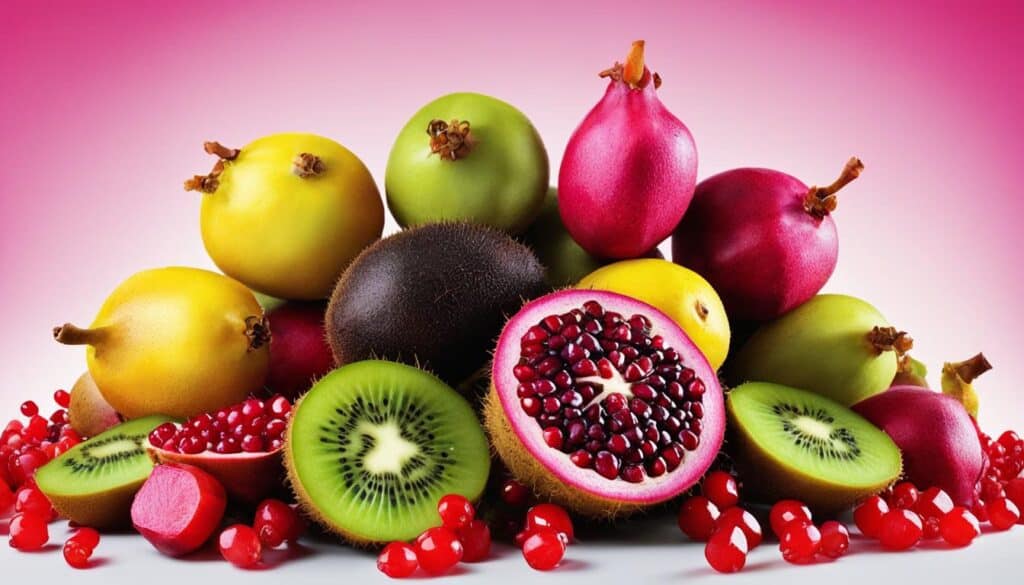
Campaigns and Initiatives to Reduce Food Waste
As awareness about the health benefits of fruits and the importance of including them in our diet continues to grow, there has been a corresponding increase in efforts to reduce food waste and promote the consumption of imperfect produce. Supermarkets and start-ups alike have launched campaigns and initiatives that not only benefit the environment but also help combat food poverty and improve access to nutritious fruits.
One such initiative is Fruitful Futures led by a major supermarket chain. This program aims to educate consumers about the health benefits of fruits and encourage them to make conscious choices when purchasing produce. They work closely with farmers to promote the consumption of imperfect fruits, emphasizing that their nutritional value remains intact despite their appearance.
Start-ups are also making positive changes in this area. RescueFruit is an innovative platform that connects consumers with local farmers who have excess or imperfect produce. By purchasing these fruits at a lower price, consumers not only contribute to reducing food waste but also gain access to affordable and nutritious options.
Another campaign that deserves recognition is Fruity Goodness, an initiative that facilitates partnerships between supermarkets and charities. Through this collaboration, supermarkets donate surplus fruits to local food banks and community programs. This not only ensures that these fruits are not wasted but also provides essential nutrition to those who cannot afford fresh produce.
These campaigns and initiatives are not only tackling food waste but also raising awareness about the health benefits of fruits. By encouraging consumers to embrace imperfect produce, they are breaking the social norms surrounding appearance and empowering individuals to make sustainable and nutritious choices for themselves and their families.
| Campaign/Initiative | Description |
|---|---|
| Fruitful Futures | A major supermarket chain’s program that educates consumers about the health benefits of fruits and promotes the consumption of imperfect produce. |
| RescueFruit | An innovative platform connecting consumers with local farmers who have excess or imperfect produce, offering affordable and nutritious options. |
| Fruity Goodness | A campaign that facilitates partnerships between supermarkets and charities, allowing surplus fruits to be donated to local food banks and community programs. |
The Psychology of Perfection and Food Choices
When it comes to selecting fruits and vegetables, our choices are often influenced by psychological factors that prioritize visual appeal. Perfectly shaped produce can be irresistibly attractive, although their flawless appearance doesn’t necessarily guarantee superior taste or nutrition. This section explores the impact of our inclination towards perfection and its potential implications for our overall food choices.
The Allure of Perfectly Shaped Produce
The Relationship Between Breedings and Perfect Produce
When it comes to fruits, breedings play a significant role in determining their appearance and size. However, these breeding practices often prioritize aesthetics over other important factors such as taste and nutritional content. This approach has led to perfect-looking fruits that lack the full range of flavors and health benefits that nature intended.
While visually appealing fruits may be enticing, it is essential to consider the advantages that fruits offer over vegetables. Fruits are not only delicious but also packed with essential nutrients that promote overall health and well-being.
Let’s dive deeper into the relationship between breedings and perfect produce, and explore the need for a more balanced approach in cultivation.
“The quest for perfection in produce has led to a disconnect between appearance and nutritional value. It’s time to rethink our breeding practices and prioritize the inherent benefits that fruits provide.”
The Impact on Nutritional Content
One of the significant drawbacks of breeding for perfection is the potential impact on the nutritional content of fruits. When breeders focus solely on appearance, important vitamins, minerals, and phytochemicals that contribute to the nutritional value may be compromised.
Research has shown that certain varieties of fruits obtained through traditional breeding practices have less nutritional content compared to their wild counterparts. This imbalance can have significant consequences for our health, as we may miss out on essential nutrients that fruits are known to provide.
A More Balanced Approach
It is crucial for breeders to adopt a more balanced approach when developing new fruit varieties. This means considering not only appearance but also taste, texture, and nutritional content. By valuing and preserving the natural characteristics of fruits, breeders can ensure that consumers can enjoy the full range of advantages that fruits have over vegetables.
Furthermore, consumers play an important role in shaping the future of fruit breeding practices. By demanding flavorful and nutrient-rich produce, we can encourage breeders to prioritize these qualities when developing new varieties.
“Balancing aesthetics, taste, and nutritional content in fruit breeding will lead to a win-win situation for both growers and consumers. We can have visually appealing fruits that are also bursting with flavor and nutrition.”
Embracing this more holistic approach to fruit breeding will not only enhance the overall eating experience but also promote a healthier lifestyle for individuals and communities. So, let’s celebrate the unique advantages that fruits offer and support sustainable, nutritionally-rich fruit breeding practices.
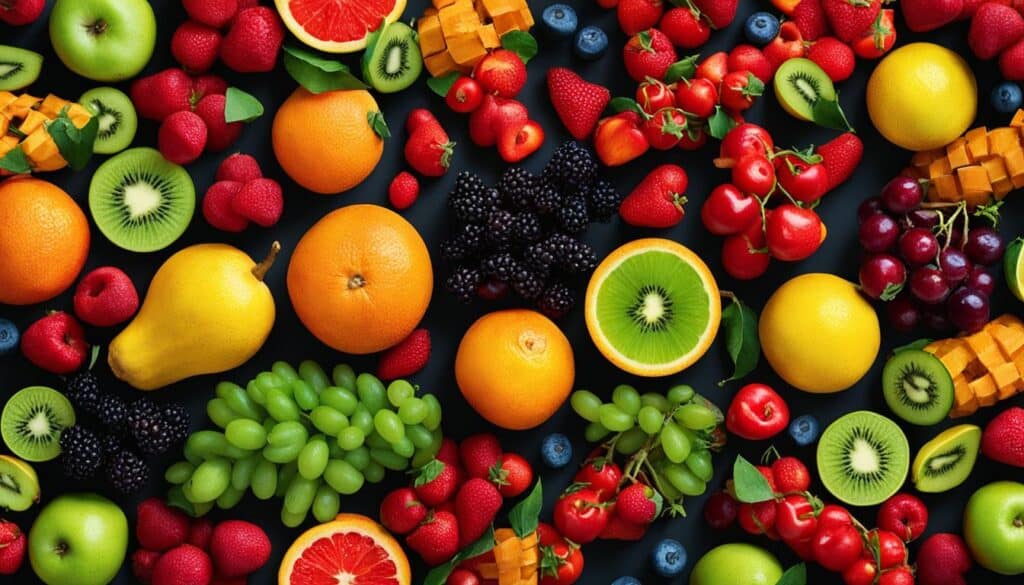
Overcoming Waste in the Hospitality Sector
As a professional in the hospitality industry, I am well aware of the significant challenges we face regarding food waste. The importance of portion control and waste reduction efforts cannot be overstated, especially when it comes to incorporating fruits into our menus.
One of the key benefits of eating fruits is their high nutritional value. Fruits are packed with essential vitamins, minerals, and antioxidants that contribute to overall health and well-being. Incorporating fruits into our diet is not only beneficial for our customers but also for our businesses.
Reducing Waste through Portion Control
Effective portion control is crucial in minimizing food waste. By carefully portioning fruit servings, we can ensure that our customers receive just the right amount without generating excess waste. This not only saves costs but also showcases our commitment to sustainability and responsible business practices.
“Perfectly portioned fruit servings not only minimize waste but also allow us to offer a consistent and delightful dining experience for our customers.”
Waste Reduction Strategies
Implementing waste reduction strategies in our restaurant kitchens is another vital step in overcoming waste in the hospitality sector. Here are some practical approaches:
- Utilize fruit in various dishes: Incorporate fruits in salads, desserts, smoothies, and even savory dishes to fully utilize their flavors and nutritional benefits.
- Use overripe fruits creatively: Overripe fruits can still be used in compotes, jams, and baked goods, providing an opportunity to reduce waste and create unique culinary experiences.
- Collaborate with local farmers: Establish partnerships with local farmers to source imperfect fruits that may not meet supermarkets’ standards but are still perfectly suitable for our kitchen needs.
To further emphasize the importance of fruits in our menu, let’s take a look at the nutritional benefits of some popular fruits:
| Fruit | Nutritional Benefits |
|---|---|
– Oranges: Rich in vitamin C, antioxidants, and fiber. Boosts immunity and promotes healthy digestion. – Apples: Contains soluble fiber and antioxidants, aiding heart health and improving digestion. – Bananas: Packed with potassium, vitamins, and fiber. Provides sustained energy and supports muscle function. – Berries (strawberries, blueberries, etc.): High in antioxidants, vitamins, and fiber. Enhances brain function and strengthens the immune system. – Watermelon: Hydrating fruit with high water content, vitamins, and antioxidants. Promotes proper hydration and aids in digestion. |
By highlighting the nutritional benefits of fruits and utilizing strategic waste reduction efforts, we can overcome waste in the hospitality sector and provide our customers with a delightful and sustainable dining experience.
The Economic and Environmental Impact of Selling Imperfect Produce
When it comes to the importance of fruits in our diet and the health benefits they provide, it’s crucial to also consider the economic and environmental impact of selling imperfect produce. Embracing and supporting the sale of imperfect fruits not only benefits our overall well-being but also contributes to sustainability and supports local farmers.
Reducing Food Waste:
“Selling imperfect produce helps to reduce food waste and minimize the resources required for production,” says Jane Simmons, a sustainable farming expert.
Every year, tons of perfectly good fruits are discarded simply because they don’t meet strict cosmetic standards. By promoting the sale and consumption of imperfect produce, we can significantly reduce food waste and its negative environmental consequences. This movement allows us to utilize an abundance of nutritious fruits that would otherwise go to waste.
Supporting Local Farmers:
Choosing to buy imperfect fruits directly supports local farmers, providing them with a market for their produce that may not meet the stringent standards of larger retailers. By purchasing these imperfect fruits, we help sustain local farming communities, ensuring their continued success and livelihood. It’s an opportunity to show appreciation for their hard work in cultivating delicious and nutritious fruits despite certain imperfections.
Promoting Sustainability:
The sale of imperfect produce aligns with the goal of promoting sustainability in the agricultural industry. By embracing these fruits and incorporating them into our diet, we reduce the demand for the overproduction of fruits solely based on appearance. This, in turn, helps conserve natural resources such as water, land, and energy, which are essential for sustainable farming practices.
In conclusion, the economic and environmental impact of selling imperfect produce is significant. By recognizing the importance of fruits in our diet and the health benefits they provide, we can create a positive change in our food system. Supporting the sale of imperfect fruits not only reduces food waste and supports local farmers but also promotes sustainability and a more conscientious approach to our consumption habits.
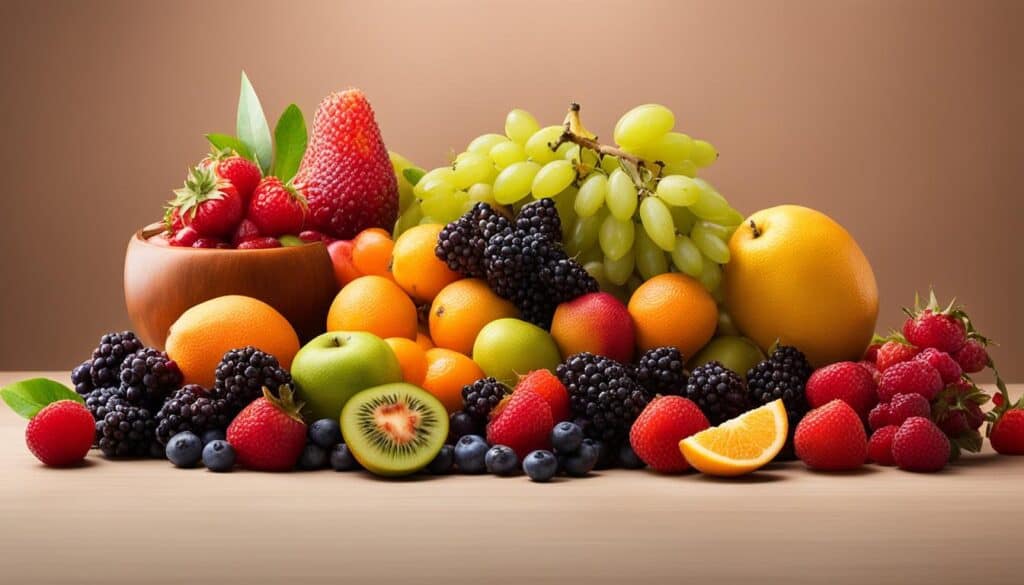
The Advantages of a Balanced Approach to Produce
Throughout this article, we have explored the debate between fruits and vegetables and the unique health benefits of fruits. As we conclude, it is important to emphasize the advantages of embracing a balanced approach to produce, recognizing the reasons to choose fruits over vegetables and the benefits of eating fruits.
By including a variety of fruits in your diet, you can enjoy a wide range of nutrients and antioxidants that contribute to overall health and well-being. Fruits are often packed with essential vitamins, minerals, and fiber that support proper digestion, boost the immune system, and promote heart health.
“Nature offers us a vibrant tapestry of fruits, each with its own distinct flavor and nutritional profile. By incorporating fruits into our daily meals, we can savor the sweetness of nature while reaping countless health benefits.”
Furthermore, choosing fruits over vegetables allows you to add natural sweetness to your diet without relying on added sugars or artificial sweeteners. Fruits can satisfy your cravings for something sweet while providing essential nutrients, making them a healthier choice compared to processed desserts and snacks.
A balanced approach to produce also involves reducing food waste and embracing imperfect fruits. By acknowledging the beauty and value of “ugly” fruits, we can significantly reduce the amount of perfectly good food that goes to waste. Not only does this help the environment, but it also supports farmers and reduces the resources required for production.
Let’s celebrate the uniqueness and diversity of fruits and choose them as our preferred source of nutrition. Incorporating fruits into our meals allows us to enjoy their vibrant flavors, nourish our bodies, and contribute to a more sustainable and balanced food system.
Remember, when it comes to fruits vs. vegetables, there are plenty of reasons to choose fruits and enjoy the numerous benefits they provide.
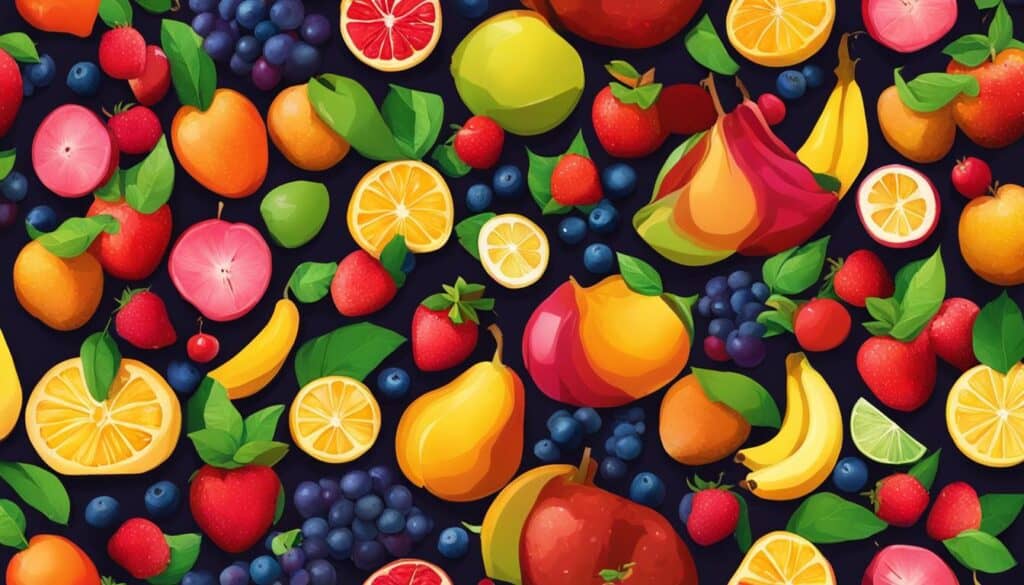
Now that we have explored the advantages of a balanced approach to produce, let’s conclude this article by summarizing the key points and reinforcing the superiority of fruits over vegetables.
Conclusion
After weighing the evidence, it is clear that fruits reign supreme over vegetables in terms of their health benefits. From providing essential vitamins and minerals to boosting our immune system, fruits offer a plethora of advantages that cannot be overlooked.
Not only are fruits packed with antioxidants and fiber, but they also contain natural sugars, making them a healthier alternative to processed sweets. Their rich and vibrant colors signify the nutritional powerhouses they are, offering a wide range of phytochemicals that promote overall well-being.
So, when it comes to choosing between fruits and vegetables, it’s no wonder why fruits should be the top pick. With their superior taste, versatility, and undeniable health advantages, incorporating more fruits into our diet ensures a delicious and wholesome way to nourish our bodies. It’s time to make fruits the star of our plates and savor the countless benefits they bring.
FAQ
Why are fruits better than vegetables?
Fruits are better than vegetables because they offer a wide range of health benefits. They are packed with essential nutrients, high in fiber, and contain powerful antioxidants that can boost your immune system and reduce the risk of chronic diseases.
What are the health benefits of fruits?
Fruits provide numerous health benefits, including improved digestion, enhanced heart health, weight management, and increased energy levels. They are also beneficial for healthy skin, strong bones, and better cognitive function.
What are the reasons to choose fruits over vegetables?
There are several reasons to choose fruits over vegetables. Fruits are generally sweeter and more appealing to the taste buds, making it easier to incorporate them into your daily diet. They also tend to provide a wider variety of flavors, textures, and colors, making meals more enjoyable and satisfying.
What are the nutritional advantages of fruits?
Fruits are rich in essential vitamins, minerals, and antioxidants. They are low in calories and fat, making them an excellent choice for weight management. Fruits also provide natural sugars, fiber, and water, which are essential for maintaining a healthy digestive system.
What is the distinction between fruits and vegetables?
Fruits and vegetables can be distinguished based on their anatomical structure. Fruits are the mature ovaries of flowering plants and contain seeds, while vegetables encompass all other edible parts of a plant, such as stems, leaves, and roots.
Why are fruits important in the diet?
Fruits are important in the diet because they provide essential nutrients that support overall health and wellbeing. They contain vitamins, minerals, and antioxidants that can help prevent chronic diseases, boost immune function, and promote optimal bodily functions.
How can I incorporate more fruits and vegetables into my diet?
There are several strategies you can use to incorporate more fruits and vegetables into your diet. Try replacing meat with vegetables in your favorite recipes, add fruits to your breakfast or snack options, explore different cuisines that focus on plant-based proteins, and experiment with new fruit and vegetable combinations.
What is the impact of perfect produce standards?
Perfect produce standards contribute to food waste because fruits and vegetables that do not meet the strict aesthetic criteria are often discarded. This leads to a significant amount of edible produce being wasted and negatively impacts the environment.
How can we reduce food waste and promote the consumption of imperfect produce?
Supermarkets and start-ups have launched campaigns and initiatives to reduce food waste by promoting the consumption of imperfect produce. They sell unattractive but perfectly edible fruits and vegetables at a discounted price, saving them from being wasted and addressing the issue of food poverty.
What are the psychological factors that influence consumer preferences for perfect produce?
Psychological factors such as visual appeal and the perception of taste and quality play a significant role in consumer preferences for perfectly shaped produce. Consumers often associate attractive appearances with superior taste and nutritional value, leading them to choose visually appealing options over imperfect produce.
How do breeding practices affect the quality of produce?
Breeding practices often prioritize shape and size over taste and nutritional content, resulting in produce that may look perfect but lacks flavor and essential nutrients. It is essential to adopt a more balanced approach in breeding to ensure that produce meets both visual and nutritional criteria.
How can the hospitality sector overcome food waste?
The hospitality sector can overcome food waste by implementing portion control measures, practicing waste reduction techniques in restaurant kitchens, and partnering with organizations that redistribute surplus food to those in need.
What are the economic and environmental benefits of selling imperfect produce?
Selling imperfect produce has economic benefits as it supports farmers by reducing the financial loss associated with unsellable crops. It also has environmental benefits by reducing water and energy consumption and decreasing the amount of agricultural waste that ends up in landfills.
What are the advantages of embracing a balanced approach to produce?
Embracing a balanced approach to produce helps reduce food waste, maximize nutritional benefits, and support sustainable farming practices. It allows consumers to enjoy a variety of fruits and vegetables, promoting a healthier lifestyle and benefiting the environment.

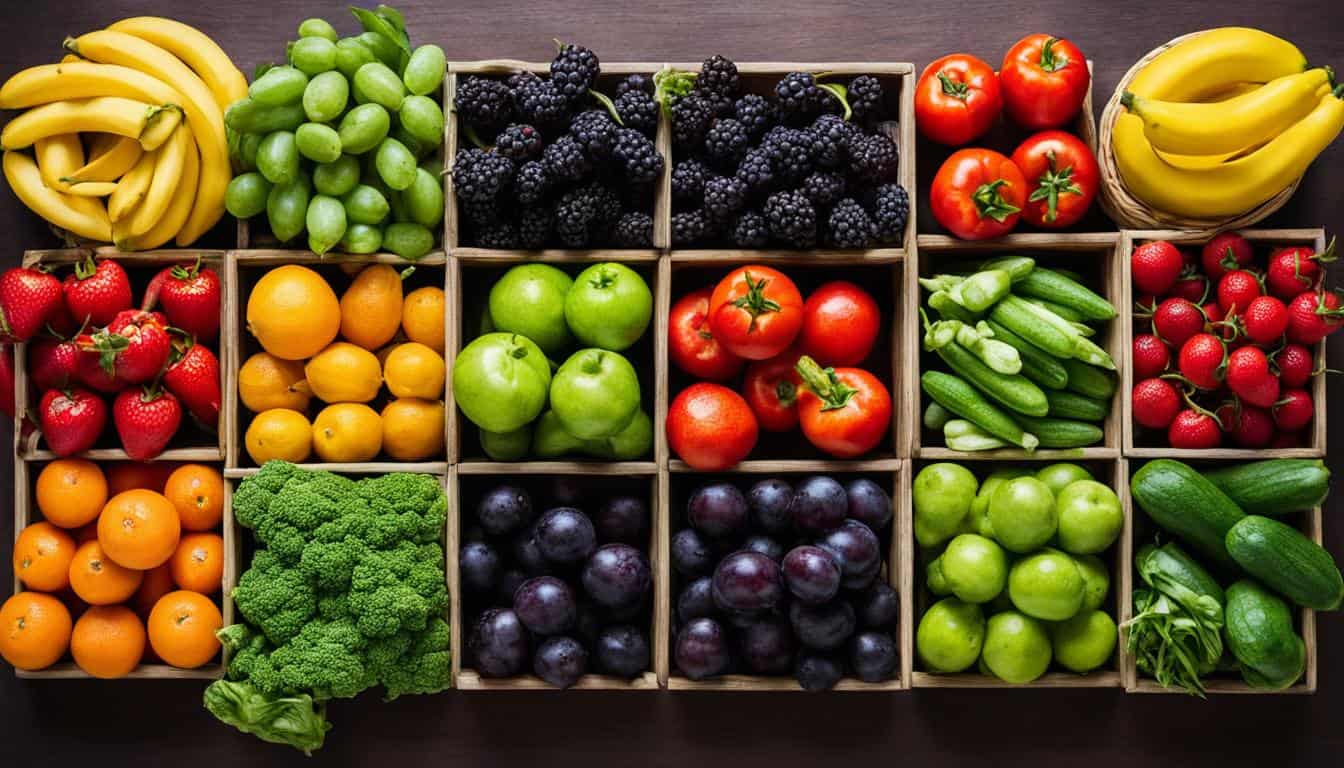



Leave a Reply